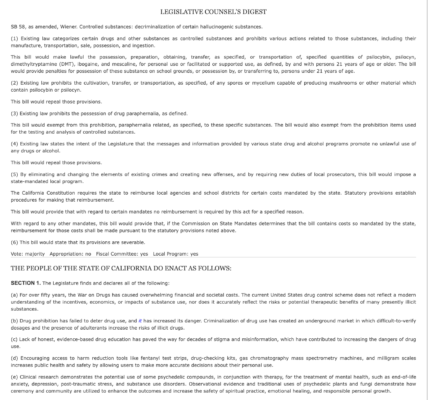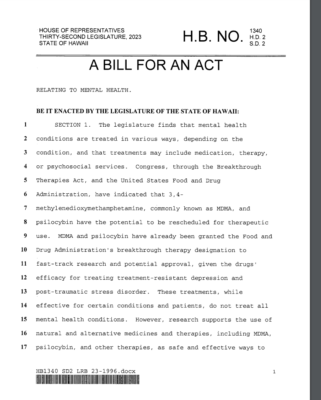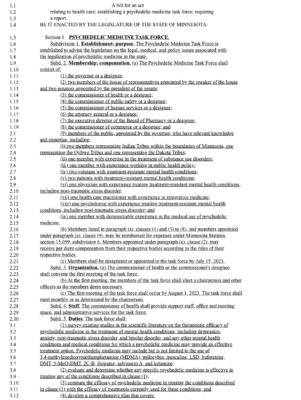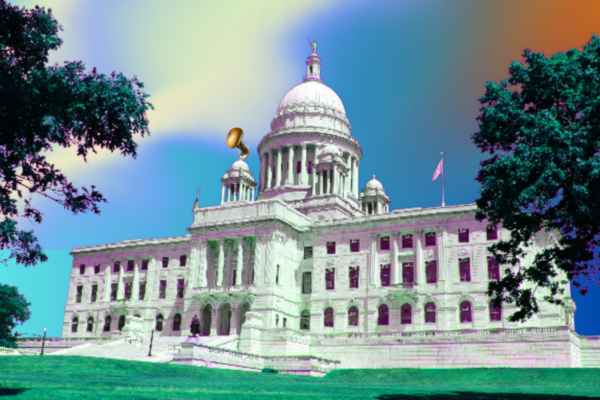
A wave of psychedelic news has recently hit the headlines as we see multiple states pushing for the decriminalization and advancement of certain substances.
- California is leading the charge by advancing a bill to decriminalize psychedelics through the state legislature
- Hawaii has approved a bill to establish a Psychedelics Advisory Council to prepare for federal approval
- Minnesota lawmakers have included psychedelic provisions in a large-scale health bill
- Health-care professionals fight against the decision to reject access to psilocybin for training purposes
- A new study has discovered the first hard evidence of psychedelic use in Bronze Age Europe.
As we continue to learn more about psychedelics and their potential benefits, it’s clear that this is an area of science that we should keep our eye on.
California advances bill to decriminalize certain psychedelics through state legislature
The legislation, which focuses on plant-based psychedelics, faces an uphill battle as a similar bill was stalled by legislators last year.

Sponsored by Senator Scott Wiener, SB 58 would decriminalize the possession and use of some psychedelic substances in California. The proposed legislation was passed by the Senate Public Safety Committee on March 21 and will now be sent to the Appropriations Committee.
SB 58 would decriminalize psilocybin, dimethyltryptamine (DMT), ibogaine, and mescaline (excluding peyote). The legislation is sponsored by Heroic Hearts Project, a nonprofit organization dedicated to connecting military veterans struggling with mental trauma with therapies based on plant based psychedelic medicines.
While SB 58 retains much of the language from last year’s legislation SB 519, the bill now focuses more narrowly on plant based medicines. Synthetic psychedelics including MDMA and LSD, which appeared in SB 519, have been removed to address opposition by the California Police Chiefs Association. SB 519 was amended to remove ketamine to appease legislators on the Assembly Public Safety Committee in June 2021.
Following his press conference on SB 58 in December, Senator Wiener explained that the California Police Chiefs Association, who had opposed SB 519 during the previous session, had agreed not to oppose the legislation if MDMA and LSD were removed. He reflected on the significance of working with the organization and their support for the new legislation.
“The police chiefs are a very impactful institutional player in the capital, it’s a very, very respected organization,” says Wiener on their decision not to oppose SB 58. “I’ve found the police chiefs to be a very thoughtful law enforcement organization that we can have nuanced conversations with. And they worked with us in good faith last year, and I’m appreciative that they haven’t been opposed.”
An analysis developed by legislative staff ahead of the hearing by the Senate Public Safety Committee includes the names of prominent supporters in the coalition to support SB 58. They include the San Diego drug policy reform group, A New Path, the Alameda County Democratic Party, California Institute of Integral Studies, California Public Defenders Association, the California cities of Eureka and West Hollywood, Disability Rights California, Dr. Bronner’s, National Association of Social Workers, Oakland City Council Member Rebecca Kaplan and the San Francisco Public Defender.
Analysis by the Assembly Public Safety Committee also offers insight into which groups are opposing the legislation. Wiener points out that “a lot of the police unions have opposed.”
The list of those in opposition to SB 58 includes 29 entities, 26 of which are law enforcement organizations and lobbying groups. These include the California District Attorneys Association, California State Sheriffs’ Association, and California Statewide Law Enforcement Association.
The three non-law enforcement groups listed in opposition include: California Contract Cities Association which lobbies for legislation that strengthens local control for California cities, Citizens Commission on Human Rights, a “nonprofit mental health watchdog group” founded by the Church of Scientology in 1969, and Concerned Women for America, a lobbying organization whose stated mission is promoting “Biblical values and Constitutional principles through prayer, education, and advocacy.”
Addressing the opposition that SB 58 has received from police unions, Wiener observes that “there are police unions instinctively opposed to everything in terms of criminal justice reform, and they apparently support the war on drugs and incarcerating people for drug use, which is a failed strategy.”
Another pending bill in the California legislature, The End Veteran Suicide Act (AB 941), would authorize a licensed professional clinical counselor to administer controlled substances to combat veterans. The legislation was introduced by Marie Waldron, a Republican representing parts of San Diego and Riverside county. The bill offers some protections for combat veterans seeking psychedelic-assisted therapies.
The proposed legislation would require the psychedelic-assisted therapy to take place over a minimum of 30 sessions and would require a therapy session to be a minimum of 12 hours in duration, which may occur overnight, as necessary. The bill would also require two or three licensed professional clinical counselors to be present per patient at a psychedelic-assisted therapy session.
Added together, this means that AB 941 would require a minimum of 720 to 1,080 therapist hours per patient, making the cost of these treatments unfeasible for many, particularly those from marginalized communities.
Hawaii approves bill to create Psychedelics Advisory Council to prepare for federal approval
The Hawaii Senate has approved a bill to create an advisory council to look into possible regulations to provide access to federal “breakthrough therapies” like psilocybin and MDMA.

The legislation from Rep. Adrian Tam (D), which previously moved through the House and has since been amended by Senate committees, passed the full chamber without discussion as part of a package of measures on the consent calendar on Tuesday. It now goes back to the House for concurrence.
The bill that passed the Senate on Tuesday was recently amended to require, rather than allow, the state Department of Health (DOH) to establish the Breakthrough Therapy Designation Advisory Council. The department supported an earlier version that gave it the option to create such a panel; it’s unclear if the mandate language will affect its position on the legislation.
DOH separately provided neutral testimony on other psychedelics policy research proposals last month, and a representative said that the department felt it would be a “more meaningful” step for lawmakers to simply legalize substances like psilocybin and MDMA to prepare for their potential federal approval as medicines.
Rescheduling would allow medical professionals to “more openly discuss their experiences” in their practices, and “the market will respond,” the DOH official said.
The department reiterated that position in written testimony in support of the legislation that was submitted last week prior to a Senate committee adopting the amendment to mandate an advisory council.
“For treatments with potentially broader application, a community conversation to prepare for the four- to six-year timeline post-Breakthrough Designation approval process is a prudent investment,” it said.
The governor’s Office of the Wellness and Resilience also testified in strong support for the measure.
Here’s what HB 1340 would accomplish as amended:
- An advisory council would be created, tasked with exploring state and federal regulations on certain psychedelics, in addition to reviewing scientific literature related to using them for mental health treatment.
- The council would need to assess FDA breakthrough therapies within three months of FDA giving the substance that designation.
- Members of the council would need to include the OWR director, state attorney general, law enforcement director, legislative leadership and a physician. Others could be appointed by top lawmakers and the OWR director.
- The body would need to examine the “requirements, specifications, and guidelines for a health care professional to prescribe and provide various treatments for patients who may benefit.”
- No later than one year after convening, the council would need to submit a report, including any proposed legislation, to lawmakers with its findings.
You may also like: Hawaii moves one step closer to creating a therapeutic psilocybin working group
Minnesota Lawmakers Include Psychedelics Provisions In Large-Scale Health Bill
Minnesota lawmakers have attached the provisions of a bill to create a psychedelics task force that would prepare the state for possible legalization to large-scale omnibus health legislation that could reach the House floor soon.
The House Health Finance and Policy Committee last week adopted an author’s amendment to the broader bill that inserted a revised version of the psychedelics measure from Rep. Andy Smith (D).
The Psychedelic Medicine Task Force, if approved, would be charged with advising lawmakers on “the legal, medical, and policy issues associated with the legalization of psychedelic medicine in the state,” the legislation says.
It would need to “survey existing studies in the scientific literature on the therapeutic efficacy of psychedelic medicine in the treatment of mental health conditions, including depression, anxiety, post-traumatic stress disorder, and bipolar disorder, and any other mental health conditions and medical conditions for which a psychedelic medicine may provide an effective treatment option.”

It would then develop a plan addressing “statutory changes necessary for the legalization of psychedelic medicine” and “state and local regulation of psychedelic medicine.”
In addition to some mostly technical changes, the author’s amendment adopted in committee also changed the psychedelics bill as it was introduced in standalone form in two substantive ways. First, the number of substances that the task force would be narrowed to just psilocybin, MDMA and LSD.
Previously, the task force would have been instructed to also look at mescaline, bufotenine, DMT, 5-MeO-DMT, 2C-B, ibogaine, salvinorin A and ketamine.
Members of the panel last week also adopted the amendment without including a prior committee-approved change to the task force appointment provisions. In an effort to bolster the bill’s bipartisan appeal, the sponsor made it so the minority leaders of both chambers, as well as the majority leaders, could each appoint one member. But that revision has been stripped in the omnibus.
The 23-member task force would have to consist of officials and experts, including the governor or a designee, the health commissioner, the state attorney general or a designee, two tribal representatives, people with expertise in substance misuse treatment, public health policy experts, military veterans with mental health conditions and more.
“The task force shall submit two reports to the chairs and ranking minority members of the legislative committees with jurisdiction over health and human services that detail the task force’s findings regarding the legalization of psychedelic medicine in the state, including the comprehensive plan developed under subdivision,” it says. “The first report must be submitted by February 1, 2024, and the second report must be submitted by January 1, 2025.”
Health-care professionals fight decision to reject access to psilocybin for training
Health Canada argued it hasn’t seen evidence that therapists ingesting the psychedelic trains them to provide more effective treatment. In response, a coalition of Canadian healthcare professionals has claimed that they are violating the rights of hundreds of patients awaiting access to psilocybin-assisted psychotherapy when it rejected applications from health-care professionals to consume the restricted drug for training purposes.
The health workers’ lawyer, Nicholas Pope, said there aren’t enough health-care professionals licensed to provide psilocybin-assisted psychotherapy and Health Canada’s decision means patients may have difficulty accessing therapists offering the treatment.
Pope and Health Canada made their arguments as part of a request for a judicial review of Health Canada’s June 2022 decision that denied applications from 96 health-care professionals to possess and consume psilocybin — the psychedelic compound produced by magic mushrooms — as part of training to obtain a license to prescribe the drug.
The health workers — including doctors, psychologists, clinical counsellors, social workers and nurses — had requested an exemption under the Controlled Drugs and Substances Act.
Pope said the workers want the court to order Health Canada to retract its rejection of their applications to use the drug.
“Thousands of patients across Canada who suffer from treatment resistant depression, major depressive disorder, and end-of-life distress have tried countless treatments and medications but have found no relief,” he told the court.
Pope cited in his arguments several peer-reviewed studies that found such psychotherapy can safely and effectively treat patients dealing with psychological and physical pain that is otherwise treatment resistant.
In 2020, Health Canada started granting exemptions under the Controlled Drugs and Substances Act to patients suffering from end-of-life psychological distress, treatment-resistant depression, and major depressive disorder.
In December 2020 and January 2021, Health Canada granted exemptions to 19 health-care practitioners to consume and possess psilocybin as part of a psilocybin-assisted psychotherapy training program offered by TheraPsil, a non-profit organization that offers training to health-care practitioners and is working with patients to obtain psilocybin.
“Health-care practitioners have reported that the training improved their ability to treat patients, and no negative effects have resulted from this training or the exemptions,” documents submitted to court by the health workers said.
Jennifer Francis, a lawyer for Health Canada, said the health professionals have not proven that therapists ingesting the drugs during training leads to better treatment.
There are Canadians who provide the psychotherapy without having consumed magic mushrooms during their trainings, Francis said.
She also said the minister believes the health-care professionals are making “sweeping and conclusive statements about the state of the scientific evidence” on psychedelics.
“In worst-case scenarios, people have jumped from buildings after having taken psilocybin,” she said. “Lesser effects of what’s known as a bad trip (are) characterized by anxiety, fear, panic, unhappiness and paranoia.”
In response to the minister’s concerns, Pope said it’s important to note that the therapy requires a clinical expert to constantly monitor a patient so safety concerns with psychedelics are significantly reduced.
New study finds first hard evidence of psychedelic use in Bronze Age Europe
While archaeologists and historians have long suspected that people in Bronze Age Europe consumed psychoactive drugs, they now have hard scientific evidence to back it up.
And it’s all thanks to several tiny strands of human hair found impeccably preserved in a 3,000-year-old burial site in Spain.
Those hairs, researchers have found, contain traces of three different alkaloid substances that are known to cause altered states of consciousness.
Rafael Mico, a professor of archeological pre-history at the Autonomous University of Barcelona, co-authored a new study describing the findings, which was published this month in the journal Scientific Reports.





